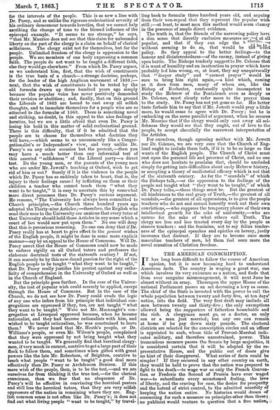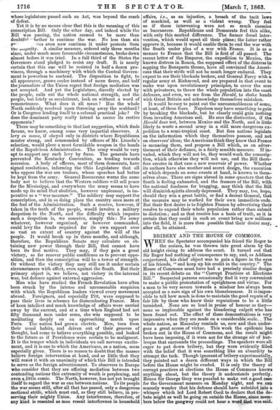THE AMERICAN CONSCRIPTION.
IT has long been difficult to follow the course of American opinion, but it is now becoming hard to understand American facts. The country is waging a great war, one which involves its very existence as a nation, and finds that from over sanguine mismanagement, it will next June be almost without an army. Thereupon the upper House of the national Parliament passes an act decreeing a levy en masse. The chief of the State is invested with the power to call the whole population between twenty and forty five, at ten days' notice, into the field. The very first draft may include all men between twenty and thirty-five ; the only exemptions allowed being the supporters of fatherless households and the rich. A clergyman must go, or a doctor, an only son or a man just married; but any one can remain at home if he pay down sixty pounds. The electoral districts are selected for the conscription circles and an 'officer is appointed to each, whose title of Provost-Marshal indi- cates military, and therefore unrestrained, power. This tremendous measure passes the Senate-by large majorities, it is considered certain that it will be adopted by the re- presentative House, and the public out of doors give no hint of their disapproval. What series of facts could be simpler ? If they occurred in any other country on earth, they would be held to prove that the nation was prepared to fight to the death—to wage war as only the French Conven- tion or Frederic the Second of Prussia have ever waged war—to subordinate every accustomed feeling, the love of liberty, and the craving for ease, the desire for prosperity and the hatred of strict control, to the admitted necerNity of keeping the nation entire. No historian would dream of accounting for such a measure on principles other than these; no publicist would venture to question that a free nation, whose legislature passed such an Act, was beyond the reach of defeat.
Yet it is by no means clear that this is the meaning of this conscription Bill. Only the other day, and indeed while the Bill was passing, the nation seemed to be more than doubtful --hether to continue the war. No less than six r-- ,r;es even now continue it under protests from the eiejority. A similar measure, ordered only three months since, under much more favourable circumstances, broke down almost before it was tried. In a full third of the States the Governors stand pledged to resist any draft. It is nearly certain that this one will be resisted in half a dozen pro- vinces, through a machinery with which the Central Govern- ment is powerless to contend. The disposition to fight, to all appearance, grows cooler instead of more fierce, and half the journalists of the Union regret that foreign mediation was not accepted. And yet the Legislature, directly elected by the people, calls out the whole national strength, and the people, but lately so recalcitrant, look on without a word of remonstrance. What does it all mean ? Has the whole North suddenly resolved upon throwing away the scabbard? Or is Congress lending itself to a colossal practical joke ? Or does the dominant party really intend to coerce its restive opponents ?
There may be something in that last suggestion, which finds favour, we know, among some very impartial observers. A levy en masse, if obeyed only in districts where Republicans muster strong, and commanded by "officers of Mr. Lincoln's selection, would place a most formidable weapon in the hands of the Republican Administration. The army would be very apt to support any such levy by force. The generals have prevented the Kentucky Convention, as tending towards secession. A body of officers, most of them democrats, have signed resolutions, informing the Ohio Legislature that all who oppose the war are traitors, whose speeches had better be kept from the army. General Rosencranz warns the same body not to believe that the Western soldiers will sell peace for the Mississippi, and everywhere the army seems to have made up its mind that abolition, however unpleasant, is im- perative as a a, war measure." The soldiery may support the conscription, and in so doing place the country once more at the feet of the Administration. Such a resolve, however, if taken in the teeth of the people, would involve a military despotism in the North, and the difficulty which impedes such a despotism is, we conceive, simply this : No army whatever, • however organized, or however commanded, could levy the funds required for its own support over so vast an extent of country against the will of the people. It would break up in three months, and although, therefore, the Republican Senate may calculate on ob- taining new power through their Bill, that cannot have been its first motive. They may, if they gain a great victory, so far recover public confidence as to prevent oppo- sition, and then the conscription will be a tower of strength. Or without the victory they may still use it under certain circumstances with effect, even against the South. But their primary object is, we believe, not victory in the internal war, but defence against external aggression.
Men who have studied the French Revolution have often been struck by the intense and unreasonable suspicion with which the Republican leaders viewed every movement abroad. Foreigners, and especially Pitt, were supposed to pass their lives in schemes for dismembering France. Men of keen intellect and much knowledge-of affairs were carried away by the current, and at a time when England had not fifty thousand men under arms, she was supposed to be meditating deeply on an approaching march upon Paris. The nation had grown electric. Men, torn from their usual habits, and driven out of their grooves of thought, had come to believe everything possible, and looked to the future as if Providence were certain to be malignant. It is the temper which in individuals we call nervous excite- ment, and it is one to which the Americans, as a nation, seem especially given. There is no reason to doubt thatthat the masses believe foreign intervention at hand, and as little that they will resist it with an unanimity of which this Bill is intended to serve as the foreign advertisement. To observers in Europe who consider that they are offering mediation between two contending nations this extremity of wrath is perplexing, and even ttlittle comic. The North, however, has not yet brought itself to regard the war as one between nations. To its people the war seems still, after all that has passed, only a dangerous sectional strife, which must end, as they still believe, in pre- serving their mighty Union. Any interference, therefore, of any kind is resented as men resent interference in household affairs, i.e., as an injustice, a breach of the tacit laws of mankind, as well as a violent wrong. They feel as if those intervening were not so much enemies as buccaneers. Republicans and Democrats feel this alike, with only this marked difference.. The former dread inter- vention, which would upset all their . plens; the latter rather approve it, because it would enable them le end the war with the South" under plea of a war with France. It is as a menace to France that the Bill is first. of passed. The• recent letter of the Emperor, the., expedition to Mexico, the knoWn distress in Rouen, the supposed effect.of the digtressin sapping the Bonaparte throne, have all convinced the Aineri- cans that their strife will not be much lone& endured. They expect to see their blockade broken; and General Korey with a regular army at Richmond, and are 'prepared in that event-to make war upon revolutionary principles, to cover the. seas with privateers, to throw the whole population into the coast defences, and even, we see from the Herald, to shake hands with Great Britain and acknowledge themselvei mistaken.
It would be easy to point out the unreasonableness of some, at least, of these fears. Napoleon may have 'something to gain by breaking the blockade, but he clearly could gain nothing from invading American soil. He sees the distinction, if the Herald does not, between Mexico and the North, and is little likely to waste a second army_ in a still more dangerous ex, pedition to a semi-tropical coast. But free nations legislate on the information which they themselves possess and not on observers' ideas; the Americans think they know that France is menacing them, and propose a Bill which, as an adver- tisement of their defiance, is a fairly sensible measure. If in- vaded, which they will not be, they would work the conscrip- tion, which otherwise they will not use, and the Bill there- fore creates in that case a new reservoir of power. Whether its authors have also another and secret design, the execution of which depends on some events at hand, is known to them- selves alone. There are signs abroad in some quarters that the South is feeling exhausted, and the framers of the Bill, with the national fondness for bragging, may think that the Bill will diminish spirits already depressed. , They may, too, hope; should they win a great battle, or find a decent General, that the measure may be worked for their own immediate ends. But their first desire is to frighten France by advertising their resolve to expend their whole population rather than submit to dictation; and as that resolve has a basis of truth, as it is certain that they could in such an event bring new millions into the field, it is more than possible that their desire may, after all, be attained.



























































 Previous page
Previous page